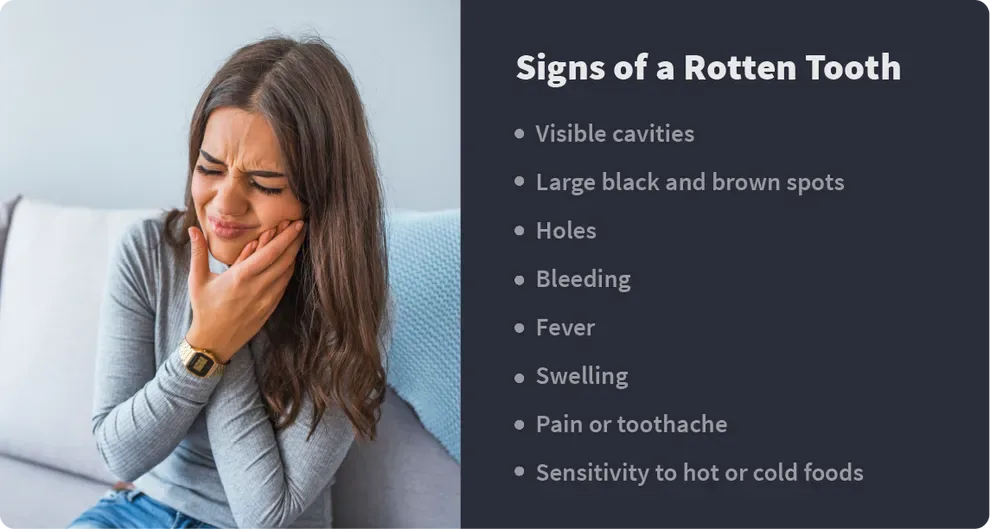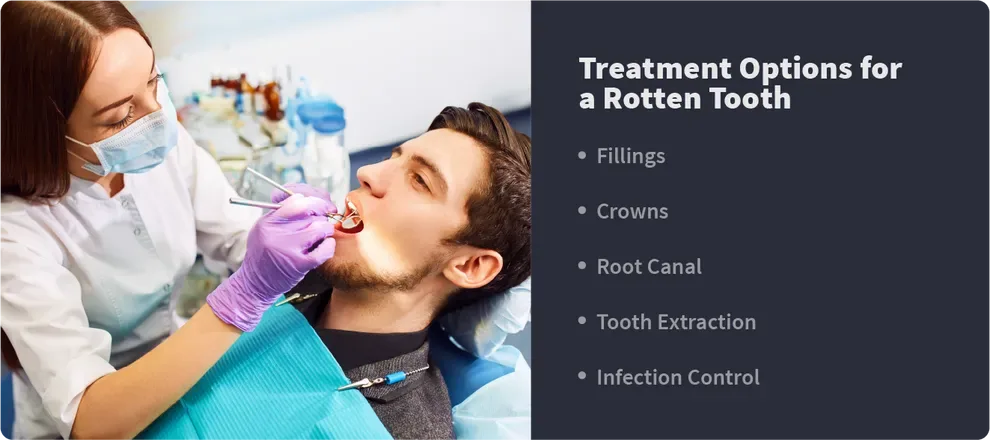Dealing with a Rotten Tooth – What Are Your Options?

Table of Contents
- What Is a Rotten Tooth?
- Causes
- Signs & Symptoms
- Treatment Options
- References
In most cases, a rotten tooth is a badly decayed tooth with one or more large cavities. In almost all cases, issues with the tooth are visible to the naked eye, although your dentist will still inspect it under magnification and probably will probe it with one or more instruments to gauge your level of discomfort.
Dealing with a rotten tooth can be a little frightening. First, it probably hurts. Second, there’s a chance you could lose the tooth.
Once a tooth is decayed this badly, it’s hard to know what treatment options might work to keep the tooth and what this means for your overall dental health.
What Is a Rotten Tooth?
A rotten tooth is pretty much any tooth that has serious decay. When a tooth is rotten, you will be able to tell simply by inspecting that part of your mouth in the mirror or with a hand mirror.
While it may not seem much worse than a cavity, a rotten tooth can lead to infections that cause more serious problems in your mouth and throughout your body. It can hamper your ability to eat, leading to potential vitamin and nutrient deficiencies if you start to feel pain.
If you think this is something you have, you should reach out to your dentist immediately for an appointment.
What Causes a Tooth to Go Rotten?
A rotten tooth is basically just a very bad cavity or a tooth that has been ravaged by decay in multiple spots. In many cases, this is due to poor oral hygiene practices, like not flossing in that area or not brushing your teeth at least twice per day.
Diet can also cause a rotten tooth. Sugar-rich foods and beverages, as well as starchy foods can lead to plaque buildup that can create serious problems in your mouth. Certain acidic and sugary foods and beverages like soda can cause even more problems since they can begin attacking your tooth enamel shortly after you consume them.
Certain medications may also impact your dental health and lead to a rotten tooth. If medications you’re taking are having a toll on your dental health, you may want to work with your doctor to find options that don’t impact your teeth in such a negative fashion.

Signs and Symptoms
The signs and symptoms of rotten teeth and tooth decay are numerous. Common symptoms include:
Rotten teeth usually have at least one large cavity that is clearly visible when you inspect your teeth in the mirror.
As decay grows, you may begin to see large black or brown spots on your teeth. These indicate major decay that can lead to infection, tooth loss and pain.
Holes in your teeth are a common sign of having a serious rotten tooth. These holes may be small, but they can grow relatively quickly if you don’t take care of them by visiting your dentist as soon as possible.
Your gums bleed regularly when you eat or care for your teeth by brushing or flossing. Bleeding gums can be a sign of a variety of dental problems including major decay and rotten teeth.
You feel like you may have an infection. Fever and general flu-like symptoms may be a sign that you’ve got an infection related to a rotten tooth. Don’t take these symptoms lightly, as they can be very serious. Your body may not be able to fight off a serious infection on its own either.
Your face seems swollen or your lymph nodes seem enlarged. These are both signs that you may have an infection related to a rotten tooth.
As your teeth get worse and decay grows, you may begin to experience pain or a mild to moderate toothache. This can be a serious sign that something is wrong in your mouth, so it’s best not to ignore it.
Pain or discomfort related to eat or drinking hot or cold foods and beverages can indicate that you’ve got major decay that has exposed the nerve or root of your tooth.
A rotten tooth is not a problem that you can put off getting treatment for, and as time progresses, the decay will become increasingly worse and lead to a severe infection.

Treatment Options
Serious cavities and rotten teeth require immediate attention from your dentist. The first thing you should do is make an appointment with a trusted dentist to have your tooth evaluated right away.
If you’re in pain or you may have an infection, let your dentist know when you schedule your appointment. They will try to fit you in earlier, as these are serious issues that shouldn’t wait.
Here are some of the most common treatment options for dealing with a rotten tooth:
In some cases, a tooth that looks badly decayed can be saved with a simple filling. Large fillings may not be as strong as your regular tooth material however, so your dentist will need to evaluate whether you’re a candidate for a standard filling.
Using a crown once your tooth material is properly cleaned and filled helps restore the strength of the tooth. Porcelain crowns look and feel very much like your natural teeth as well, making them a popular option with patients.
If your tooth is badly damaged and the pulp is infected, a root canal will be performed. Most teeth that need a root canal will require a crown once the procedure is completed.
In some cases, a tooth may be too badly damaged to fix with a filling, crown or root canal and crown. That typically means that a tooth will need to be extracted and replaced with an implant, bridge or other artificial tooth structure.
If your tooth was badly infected, but didn’t need to be removed, your dentist may prescribe antibiotics to get rid of the infection. Take these antibiotics as instructed by your dentist, following the directions on the bottle carefully once you get them home.
A rotten tooth may be unsightly, and in some cases, even painful. Getting treatment for a rotten tooth isn’t difficult though, and dentists see them practically every day.
